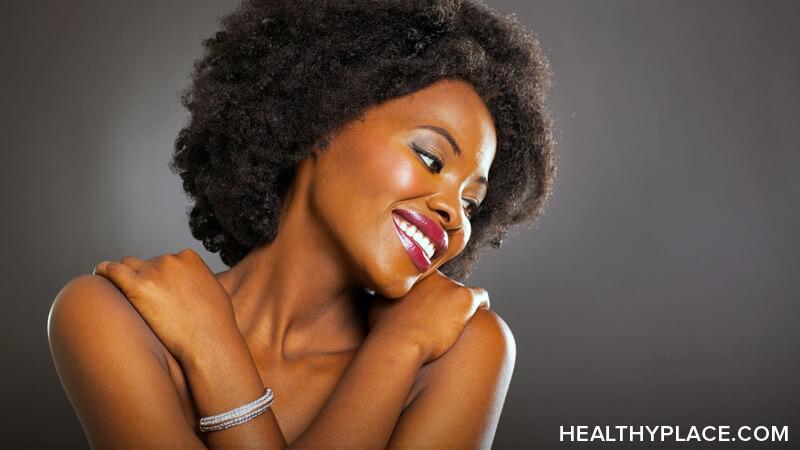Body Acceptance Is a More Realistic Goal than Body Positivity

Convincing myself that I feel poised, satisfied, uninhibited, confident, free, and at home in my own body all the time sounds excellent in theory, but I find it does not always work in practice. For this reason, I maintain that body acceptance is a more realistic goal than body positivity. Of course, it would be ideal to stand in front of a mirror and genuinely admire the curves and contours of my reflection, but this just happens sometimes—it's not an outlook I can manufacture out of sheer obligation to praise my body.
I can identify when the mantra, "I am beautiful. I am strong. I love myself," rings hollow. I don't always believe these words even as they roll off my tongue, and then I feel like a dishonest fraud. So instead of repeating this chant to myself—knowing it's often a lie—I have determined that body acceptance is a more realistic goal than body positivity. This might seem counterintuitive, so let me break down what exactly I mean.
How Is Body Acceptance Different from Body Positivity?
Body positivity requires me to celebrate my size and shape at any cost, even fake it if I need to. Body acceptance recognizes that I can have moments of discomfort or insecurity, and allows me to still be gracious toward myself. The first construct seems inauthentic in my opinion, while the second is more honest and sustainable long-term.
With body acceptance, there is no pressure to avoid or reframe my emotions—I can acknowledge the truth that sometimes it feels impossible to love what I see in the mirror, but I can find reasons to show this body kindness and gratitude too. Because these are not mutually exclusive, when I lean into the pursuit of body acceptance, I discover margin inside me for both realities to exist at the same time.
How to Prioritize Body Acceptance Over Body Positivity
To practice body acceptance in a way that is gentle but true, I focus on what my body can achieve, not how it looks. This mental shift from appearance to competence reminds me to be grateful for this body which keeps me alive, no matter how I feel about it superficially. So here is how I manifest body acceptance when talking to myself in front of the mirror, and more often than not, it works—further confirmation that body acceptance is a more realistic goal than body positivity.
"My thighs continue to push me forward on those days I wonder if I have the strength left to stand. My arms allow me to embrace and connect with the people I love most in this world. My stomach turns nutrients into energy, so I have the fuel to hike mountains at sunrise or learn yoga poses in the bedroom. My face smiles at people on the street, laughs with absolutely no restraint, and spends hours in meaningful conversation. I am thankful for these parts and what each of them do—together, they enable me to function, to move, to breathe, to experience, to live."
How do you feel about body acceptance versus body positivity? Share your thoughts in the comment section below.
APA Reference
Schurrer, M.
(2020, May 6). Body Acceptance Is a More Realistic Goal than Body Positivity, HealthyPlace. Retrieved
on 2025, December 7 from https://www.healthyplace.com/blogs/survivinged/2020/5/body-acceptance-is-a-more-realistic-goal-than-body-positivity
Author: Mary-Elizabeth Schurrer
As a 65 years old Single man, I share 1 thing I learned: It is unrealistic and unfair for women to compare each other.
For one thing, what about a woman recovering from food addiction, or who needs surgery to tighten her esophagus, comparing herself to a former model?
And comparison never stops. I used to know a former model jealous of Ann Margaret.
Hi Erwin,
Thank you for the thoughtful, insightful comment! You are absolutely right—body comparison is a vicious cycle that will not end until we make a conscious decision to accept ourselves as unique individuals and allow others that same freedom to embrace their distinct selves too.